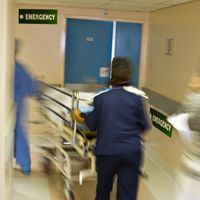Cardiac Surgery + Readmission = Opportunity for Improvement
Readmission rates among cardiac surgery patients have been reported to range from approximately 14 percent to 63 percent, a rate that far exceeds that in patients who undergo other surgical procedures.

Readmission rates among cardiac surgery patients have been reported to range from approximately 14% to 63%, a rate that far exceeds that in patients who undergo other surgical procedures. Identifying the frequency, timing, and associated risk factors for readmission after cardiac operations could help lower the readmission rate.
Researchers from a number of cardiac surgery centers in North America conducted a study of adult cardiac surgical patients (N=5,158) who were treated at 10 centers. This prospective cohort study targeted risk factors for postsurgical infection and all-cause readmissions within 65 days.
They determined that the overall readmission rate among these 10 centers was 18.7%. By procedure, the rates were:
- 14.9% for isolated coronary artery bypass grafting
- 18.3% for isolated valve
- 25% for coronary artery bypass grafting plus valve
Approximately 50% of readmissions occurred within 22 days and patients had a median length of stay of 5 days. Eighty percent of readmissions occurred in the first month and were primarily a related infection (17.1%), arrhythmia (17.1%), and volume overload (13.5%). After 30 days, readmission was less likely. Roughly 16% of readmitted patients were discharged to locations other than home.
Women were more likely to be readmitted than men, and diseases that increased readmission risk included diabetes and chronic obstructive pulmonary disease. Patients who experience elevated creatinine or lower hemoglobin were also at increased risk, as were those whose procedures were longer in duration or more complex.
The Centers for Medicare and Medicaid Services’ Readmission Reduction Initiative penalizes institutions when patients are readmitted within 30 day. This study shows that most readmissions occur within 30 days, and validates CMS’s window. The authors write that their findings are a call for action. They suggest that institutions that improve care processes related to in-hospital infections, postoperative arrhythmias, and volume overload can expect to see the largest reductions in readmissions. This article appears as an electronic publication in The Annals of Thoracic Surgery.